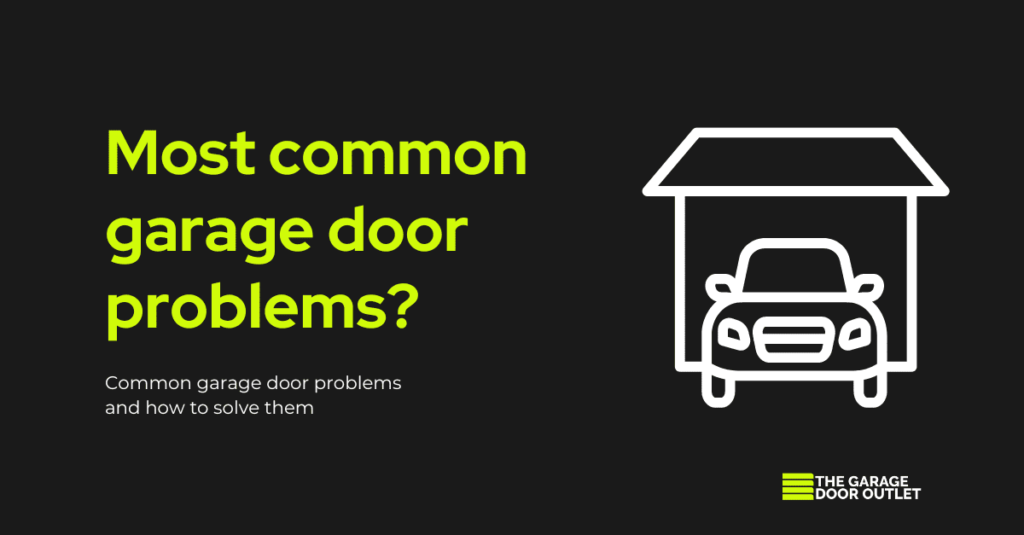Here is a list of common garage door problems and the best way to fix them.
Common garage door problems. Garage doors play a crucial role in safeguarding our vehicles and belongings while enhancing the overall aesthetic appeal of our homes. However, like any other mechanical system, garage doors are prone to wear and tear, leading to various problems. In the UK, where weather conditions can be unpredictable, garage doors face unique challenges. This article explores the most common garage door problems in the UK and offers a practical solution to address them.
1. Snapped or Frayed Garage Door Cables
Garage door cables are essential for supporting the door’s weight during operation. Over time, cables can fray, wear out, or snap, posing a safety risk. If you notice frayed cables, do not attempt to fix them yourself. Contact a professional technician to replace the cables and ensure the safe operation of your garage door.
Replacing the cables always involves either holding the spring tension while you replace the garage door cables or having to retension the spring after replacing the cables. This is why we recommend contacting a professional, because this is a dangerous job.
2. Broken Garage Door Springs
Garage door springs play a critical role in the smooth operation of the door, counterbalancing its weight and facilitating easy opening and closing. However, springs are under significant tension, and various factors can contribute to their failure. Broken springs can be dangerous and may prevent the door from opening or closing properly. Replace damaged springs promptly to ensure the safe and smooth functioning of your garage door.
Here are several reasons why garage door springs may break:
- Normal Wear and Tear
- Cycle Limit Exceeded
- Rust and Corrosion
- Improper Adjustment
- DIY Repairs and Adjustments
- Age of the Springs
- Lack of Maintenance
- Imbalance in the Garage Door
When a spring snaps, we always recommend replacing both springs.
3. Power Outages and Emergency Release Problems
Power outages can make automatic garage doors inoperable if they lack a functioning battery backup or external emergency releases. Additionally, emergency release mechanisms may also become jammed or malfunction. Ensure your garage door has a reliable battery backup or external release installed, and regularly test the emergency release to avoid being locked out during power outages or even by the release malfunctioning.
4. Remote Control Issues
Issues with garage door remotes and keyfobs are very common and can be frustrating. If your remote control fails to operate the door consistently, check the batteries, reprogram the remote, or replace it if necessary. If problems persist, be sure to give us a call, and one of our experienced engineers will attend your property to find the fault and provide you with a solution on how to fix your garage door problem.
Sometimes a remote control issue can be down to the receiver or control board. This is when it’s best to consult a professional.
5. Faulty Garage Door Opener
Garage door motors, also known as openers or operators, are crucial components that automate the opening and closing of garage doors. Various factors can contribute to the malfunction or failure of these motors.
Here are several reasons why a garage door motor can go wrong: Common issues include a malfunctioning remote control, motor problems, not being set up correctly, or worn-out gear. We recommend regularly inspecting and maintaining your garage door opener and replacing faulty parts as soon as possible to prevent unexpected problems.
6. Safety Edge/Photocell Problems
Garage door sensors and safety edges are critical components designed to enhance the safety of garage door operations by detecting objects or people in the door’s path. If your garage door doesn’t close or reverses unexpectedly, we recommend contacting a garage door specialist immediately.
Like any electronic device, garage door sensors and safety edges can experience internal faults. This may include issues with sensors, circuit boards, or other electronic components.
Addressing these issues promptly through regular inspection, cleaning, and maintenance can help prevent the potential malfunction at a later date.
7. Worn-out & Snapped Spindles/Runners
Rollers allow the garage door to move smoothly along the tracks. Over time, they can wear out, leading to a jerky or uneven operation. Replace worn-out rollers with new ones to ensure smooth and quiet garage door movement.
If the door has a cable, it is recommended to contact a garage door specialist to undergo the work because the cable around the roller holds the tension from the spring, and if it’s not dealt with correctly, it can cause serious injury.
8. Roller Garage Door Problems
One of the most common garage door problems is roller garage doors. Roller doors rely on a combination of mechanical and electrical components to function smoothly. When a roller garage door stops working, it can be due to various issues. Here are some common reasons:
- Power Supply Issues
- Snap Straps
- Control Board Problem
- Motor Problem
- Remote Control Problems
- Manual Release Engaged
- Limit Switch Issues
- Sensor/safety issues
- Obstruction in the Door’s Path
- Damaged Curtain or Guides
- Aging Components
- Cheap Roller Garage Doors
It’s advisable to seek the services of a professional garage door engineer. Give us a call, and we will conduct a thorough inspection, identify the cause of the problem, and provide an appropriate solution to get your roller garage door working again at an affordable price.
Conclusion on Common Garage Door Problems
Regular maintenance on garage doors is crucial to ensuring the longevity and optimal performance of your garage door. By addressing these common garage door problems proactively, you can avoid costly repairs and enhance the safety and functionality of your garage door system.
When faced with complex problems, contact the Garage Door Outlet to ensure a swift and effective garage door repair.


